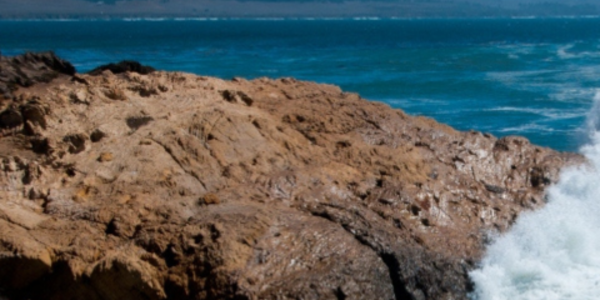NCAI brings collaborations, networking, and possibilities into focus

In 2020, Congress passed the National AI Initiative Act, which formalized the mandate for NOAA’s pioneering coordination of artificial intelligence application across climate, ocean, Earth, and space sciences. Working across scientific fields and offices, NOAA has established a center for artificial intelligence to support ongoing projects and to propel new uses of AI technology to support environmental knowledge and study.
The NOAA Center for Artificial Intelligence (NCAI) is developing under the leadership of a coalition of NOAA staff, affiliates, cooperative institutes, and partners. A major facet of NCAI is to build NOAA’s capacity to use AI and machine learning (ML) techniques to support NOAA’s mission to understand climate, weather, the ocean, and coasts.
AI became a NOAA science and technology strategy in 2019 to guide advancements in the quality and timeliness of NOAA science, products, and services. The strategy calls for the acceleration and expansion of AI applications across the agency to make “transformative improvements in NOAA mission performance and cost-effectiveness.” Using AI/ML, data can be processed more efficiently, thereby improving how science data and information are used. Furthermore, AI excels at identifying patterns in data that elude the human eye, offering improvements to many of our forecasting or prediction tools. NCAI efforts are showcased at NOAA.gov/AI.
NCAI is intended to act as a conduit for a larger “community of practice,” encompassing the NOAA workforce and other communities beyond the organization who are currently using AI/ML in Earth sciences, oceanography, geophysics, and other disciplines. Organizers hope to fold in more practitioners for future ground-breaking work.
“We want to spark conversations, provide space for networking, and encourage information sharing about AI/ML within NOAA and its scientific communities,” says leading organizer Eric Kihn of NOAA NCEI.
NOAA AI Workshops
Since 2019, NOAA has held three AI workshops geared toward AI/ML information sharing, supported by the Center for Satellite Applications and Research (STAR) and NOAA NCEI. Each yearly conference has enabled users of AI applications to exchange experiences more widely.
The 2021 workshop, which actively sought public participation worldwide, attracted more than 1,300 registrants and included 38 sessions and more than 180 presentations including talks and posters. The workshop opening plenary featured NOAA Administrator Dr. Rick Spinrad, who shared NOAA perspectives on AI. Recordings of presentations from the virtual event, including eight plenary sessions, are available on the NOAA Satellite and Information Service’s YouTube channel.
NOAA AI Partnerships
NCAI is collaborating with Earth Science Information Partners (ESIP) to define AI-ready data standards for Earth and space science through a Data Readiness Cluster. ESIP members and partners are discussing advancements and developing tools for open environmental data for AI applications. ESIP is a nonprofit organization supported by NOAA, NASA, USGS, and more than 130 member groups interested in furthering the study of Earth sciences.
Staff from several cooperative institutes are also supporting and collaborating with NCAI, including the Cooperative Institute for Satellite Earth System Studies (CISESS) at North Carolina State University, the Cooperative Institute for Research in Environmental Studies (CIRES) at the University of Colorado Boulder, and Cooperative Institute for Research in the Atmosphere (CIRA) at Colorado State University.
NOAA AI/ML Pilot Projects
A variety of AI/ML projects are underway, many of which have grown from NOAA Fisheries. For example, cameras using AI technology are helping to scan and classify protected species from aerial imagery (e.g., polar bears and ice seals, right whales), enumerate fishery catches from vessel-based cameras, and locate beluga whales using acoustic technologies. Meanwhile, other branches of NOAA have used AI to characterize marine ecosystem health by listening to underwater soundscapes, monitor humpback whale populations from their songs, forecast space weather in real-time, and so much more. Many such projects have benefitted from collaborations with industry, including Microsoft, Kitware, Saildrone, Google, as well as with academia.
The rubber meets the road in several projects piloting collaborations with the NCAI. These projects include:
- Water column sonar data. To develop a “data lake” to empower the detection and speciation of small fish.
- Land surface temperature (LST). To use satellite data from the Himawari-8 and GOES-13 imager to develop improved LST estimates.
- Magnetic navigation. Engaged the broad data science community in an X-prize competition to develop models for forecasting a key space weather activity parameter to improve magnetic navigation, demonstrating that crowdsourcing our AI/ML problems across the international data science community is an effective path.
NCAI Training and Tutorials
NCAI is creating learning opportunities for scientists and staff who want to use AI/ML techniques in their work. From tutorials to best practices, NCAI is compiling materials, training, and ideas into a library of resources to search, discover, and tailor learning experiences. A clearinghouse of internal and public resources is under development to leverage standard tools such as Google Colab, Binder, and Github. NCAI welcomes contributions (e.g., Jupyter notebooks) from researchers that are interested in sharing their AI knowledge. Hackathons have also been offered to expand learning by engaging teams to solve real-world scenarios.




